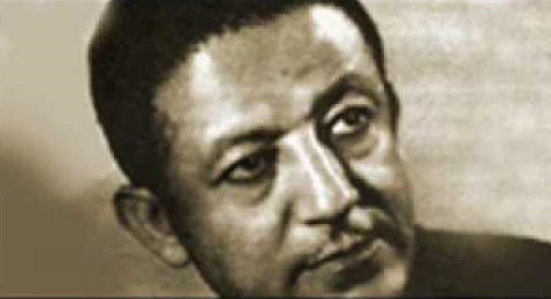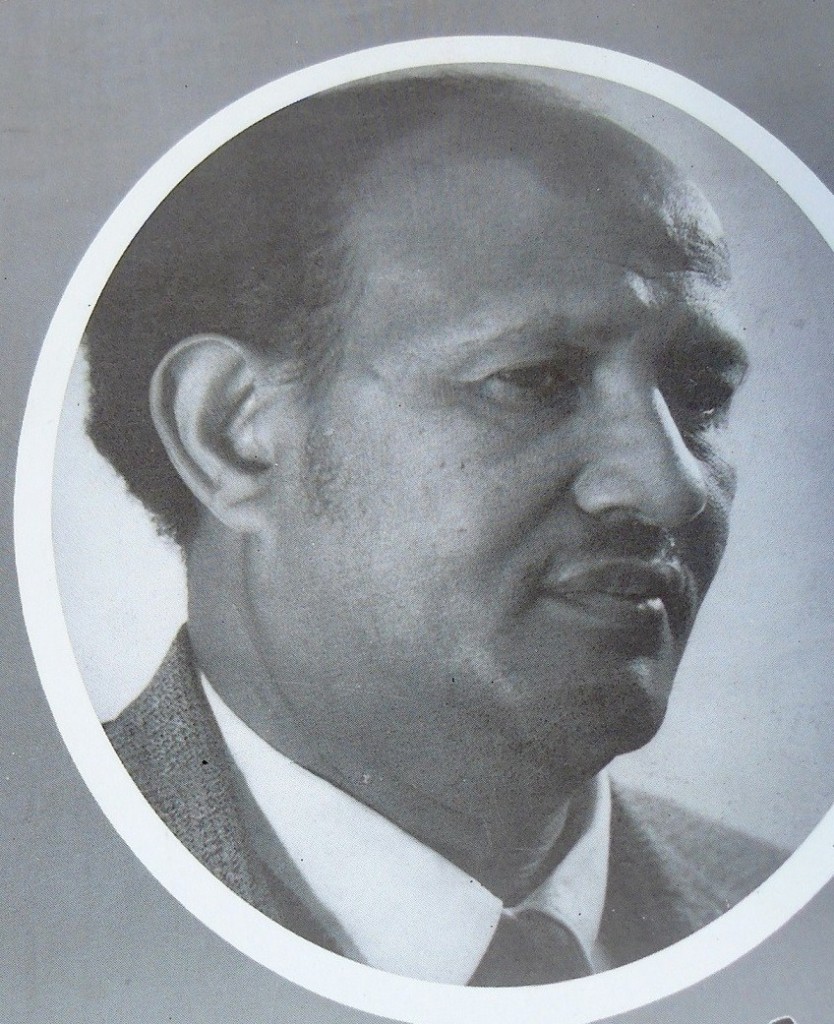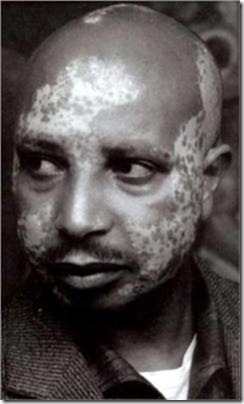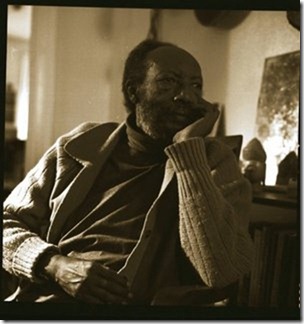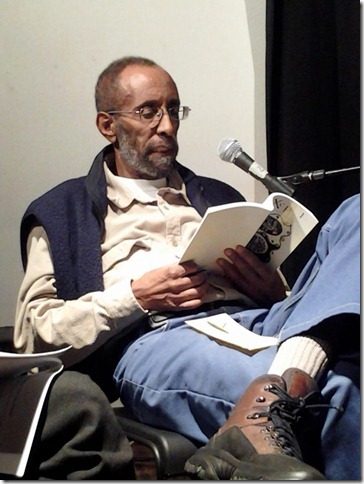Kebede Mikael
The nature of Man
Once upon a time, God ordered all the animals
to gather in a field: all birds and mammals
created from His breath, from mighty strongbones
to the smallest gnat sat down before his throne.
He called Monkey to account: “Look, Monkey,
here are all my creatures from humble Donkey
to the haughty Lion, tell me if you think their beauty
exceeds yours, don’t be afraid to speak truthfully,
I will correct whatever you see as your defect.â€
But Monkey answered like a shot: “Defect?
My face is ruggedly appealing, my chest is manly
and my hands and tail are simply heavenly!
Why should I beg you for a change, when here I stand
on two of the shapeliest legs in the land?
If you are looking for a project, Lord, I’d begin
with Hyena’s slanted back, his foolish grin!â€
Hyena sidled up to answer the same question.
He simpered that he knew his education
was a little basic but his dusty spots
could tie a young hyeness’ heart in knots.
Much better, in his lispy view, to overhaul a beast
like Elephant, whose ears could use a cut and paste
and stick the trimmings to his scrawny tail!
So Elephant appeared to wails
of laughter, everyone expected he would rush
to ask the Lord to wield his broadest brush
and re-invent him. But all he did was praise
our Great Creator for his delicate greys:
“I never saw a single fault in my appearance!
It’s Whale who waddles through the sea and flaunts
her shapeless bulk, why not remodel her
and put a stop to all our laughter?â€
But Whale was just the same.
Every animal thoroughly enjoyed to name
the flaws in others, to snicker, scoff
and pride themselves as superior stuff.
So God dismissed them all. As I do now,
but I would like to show you how
we can be different: by telling our defects
as humans, examine how imperfect
our paper generosities, lush-sounding words,
when look! we are such small mean lords
pumped up with self-importance,
empty and rude-fingered sycophants!
We humans should tell the Earth and Sky
how cruel we are, but it comes as no surprise
when our strutting tongues collapse
and will not say a word. Our mouth-traps
open for gales of mockery: liars laugh
at blind men, who hear well enough
to snigger at peg-legs, and peg-legs like to jeer
at baldies, baldies at the stutterers who leer
at pompous clerks who themselves ridicule
the hatless customer, and hatless makes a fool
of silly face and silly face laughs at ugly
and ugly mocks a leper for his leprosy —
and who will the leper find to criticise?
oh yes, a cuckold racked with jealousies!
Man, strange being, uncorrectable,
two-faced but strangely simple,
continues his own bad example.
Generations come and go, we stay the same,
like passengers on a commuter train.
We’re all alike in this, just different
in superficialities. We were always meant
to give ourselves a long hard stare
and see the library list of imperfections there.
That’s why I think it would be so much better,
if we all agreed, not to laugh at each other.
~ Kebede Mikael, trans. from Amharic by Chris Beckett
Dr. Kebede Mikael is regarded as one of Ethiopia’s greatest 20th-century writers and thinkers. He authored a total of 26 books, and his wide range of translations from various languages includes Amharic versions of ‘Romeo and Juliet’ and ‘Macbeth’. In 1990, he received an Honorary Doctorate from Addis Ababa University for his unparalleled excellence in literature, and for inspiring generations of Ethiopian authors and writers.
Chris Beckett grew up in Ethiopia in the 1960s and his acclaimed collection of praise shouts and boasts, ‘Ethiopia Boy’, was published by Carcanet in 2013. The book of his collaborative project with artist Isao Miura, ‘Sketches from the Poem Road’, has been shortlisted for the Ted Hughes Award 2015.
Mengistu Lemma
Longing
The train hauled me out of London —
out of the smoke, the smog, the grime,
the filthy mix of soot and dust —
while the train spun fog from the fabric of steam,
clothing the land with its garment
of blessings and punishment,
Yizze kataf, yizze kataf, goes the powerful weaver.
Isn’t it amazing? Life’s a miracle:
coal smoke set free through the power of coal!
The carriage was big enough for ten,
but no-one was brave enough to open the door
I’d shut fast to keep in the warmth.
Instead, they huddled in the corridor,
unwilling to share the warmth with a black man —
even though coal is black, even though
the wealth of England was forged by black coal.
The train whistled like a washint flute;
haystacks dotted the distant fields,
just like the straw roofs of houses in a village at home.
And in the blink of an eye, I turned into
‘a traveller of God’ in the meadows of England…..
‘Greetings to your household!’ I cried,
‘I am your “blackâ€, your unexpected, guest:
your kindness to me will bring you God’s blessings’.
‘Welcome, come in!’ the head of the household replied.
Then his wife brought a bowl of warm water,
and kneeling down happily to wash my feet,
‘Don’t be shy, my friend,’ she said.
First my mouth blessed that tulla beer of Gojjam,
then a bowl arrived, and my empty stomach began to fill
as I licked the linseed oil of Gondar from my fingers;
next, chicken stew rich with curds. Contented,
I yawned. Sleep overcame me as I lay down
on fine cotton and was covered with wool…
Dimly, I heard the door slide open — but was fully awake
by the time it slammed shut. I jumped,
but then calmed myself down,
glowering at the reckless young man,
the brave one who’d dared to enter my den as I slept.
But his spotless shirt and neat matching tie
made me laugh: he was so amazingly clean!
~ Mengistu Lemma, trans. from Amharic by Martin Orwin, Sarah Maguire and the Poetry Translation Centre Workshop, SOAS London
Mengistu Lemma was an Ethiopian playwright and poet. He was part of the socially committed trend in Ethiopian literature, which was concerned with popularizing indigenous culture; his main contribution to this movement included a collection of poems called ‘Yabbatoch Ch’ewata’ (Pastimes of the Forefathers).
Sarah Maguire is a British poet and translator. She is the founder and director of the Poetry Translation Centre, which opened in 2004.
Martin Orwin is a British linguist, scholar and writer, specializing in the languages and cultures of the Horn of Africa.
Gebre Kristos Desta
Solace
~ Gebre Kristos Desta, trans. from Amharic by Solomon Deressa
Gebre Kristos Desta was an artist, poet and teacher. Born in Harrar, he later established himself as an independent artist in Addis Ababa, and his work was exhibited both in Ethiopia and abroad.
Solomon Deressa, born in western Ethiopia, is a poet, screenwriter, and essayist. His first book of poems, ‘L’jnnet’ [Youth], has been described as a turning point in modern Ethiopian poetry.
Editor’s note: This translation first appeared in the Ethiopia Observer 1966 Vol 11/no 3: ‘Gebre Kristos Desta: Sombre Colours and Incantatory Words’.
Tsegaye Gebre-Medhin
Nile
I am the first Earth Mother of all fertility.
I am the Source, I am the Nile, I am the African, I am the beginning!
O Arabia, how could you so conveniently have forgotten,
while your breath still hangs upon the threads of my springs?
O Egypt, you prodigal daughter born from my first love,
I am your Queen of the endless fresh waters,
who rested my head upon the arms of Narmer Ka Menes
when we joined in one our Upper and Lower Lands to create you!
O Sudan, born out of the bosom of my being,
how could you so conveniently count down
in miserable billions of petty cubic yards
the eternal drops of my life-giving Nile to you?
Beginning long before the earth fell from the eye-ball of heaven,
O Nile, that gushes out from my breath of life
upon the throats of the billions of the Earth’s thirsty multitudes,
O World, how could you so conveniently have forgotten
that I, your first fountain, I your ever Ethiopia
I your first life still survive for you?
I rise like the sun from the deepest core of the globe.
I am the conquoror of scorching pestilences.
I am the Ethiopia that “stretches her hands in supplication to God”.
I am the mother of the tallest traveller on the longest journey on Earth!
My name is Africa, I am the mother of the Nile.
O Nile, my prodigal daughter in the wilderness of the desert,
bringing God’s harmony to all brothers and sisters
and calming down their noises of brass in their endless nakednesses,
O Nile, you are music that restores the rhythm of existence
into the awkward stampeding of these Middle Eastern blindnesses,
you are the irrigator that cultivates peace
from my Ethiopian sacred mountains of the sun,
across to nod on the East of Aden and across Sinai,
beyond Gibraltar into the heights of Mount Moriah,
O Nile, my chosen sacrifice for a universal peace offering
upon whose gift the heritages of Meroe and Egypt
still survive for the benefit of our lone World.
You are the proud daughter, O Nile, who taught
the ancient world how to walk in upright grace!
You are my prodigal daughter who saved and breast-fed
little lost Jacob whose brothers sold for food,
you, who nurtured, fed and raised
the child prophet called Moses on your cradle,
you, who stretched out your helping hand and protected
the baby Christ from the slaughtering swords of Herod,
O Nile, my infinite prodigal daughter
at whose feet mountains like Alexander bent
their unbendable heads to drink from your life-giving milk,
O Nile, at whose feet giants like Caesar knelt,
conquerors like Napolean bowed
their unbowable heads to partake from your imortal bounty.
O Nile, you are the majestic blood line of my African glory
that showers my blessings upon the starved of the world,
you are the eloquence that rings the Ethiopian bell across the deaf world!
You are the gifted dancer of graceful rhythms
that harmonize with your sisters Etbara and Shabale,
with your brothers Awash and Juba,
to fertilize the scorched sands of Arabia.
O Nile, without your gift Mediterranean shall be a rock of dead waters
and Sahara shall be a basket of skeletons!
You are Africa’s black soil that produces life.
You are the milk that quenches the thirsty multitudes.
You are the messenger of my gospel, O Nile,
that brings my abundant harvest to the mouth of the needy.
You are the elegant pilgrim of my mercy.
You are the first fountain, you are the first ever Ethiopia.
You are the appeaser of the lustful greeds.
You are the first Earth Mother of all fertility,
Rising like the sun from the deepest core of the globe.
You are the conqueror of the scorching pestilence.
You are the source, the Africa, the Ethiopia, you are the Nile.
~ Tsegaye Gebre-Medhin
Tsegaye Gebre-Medhin was Poet Laureate of Ethiopia, and was elected to the United Poets Laureate International. He was also a playwright, essayist, translator, and art director.Â
Editor’s note: ‘Nile’ was written in English, August 1997.
Solomon Deressa
Poem to the Matrix
image and syllable part like the Eritrean Sea
Somalia disintegrates at the tight end of unity
highlanders, eyes shut, chase a cat’s-tail atonement
dreamer and dream now live and die lives apart
Sabean images gone, the syllabary stays behind
going this way, then that, before deciding on left to right…
leeching first on prophetic sleight-o’hand then on parting waves
then on redemption, here as elsewhere, shorn of compassion
arcane allusions separate lofty brow from dancing feet
in-bred decorum licks the door to primal mystery ———–
only the occasional song leaks between door and wall
to repeat what we’ve heard thrice before
the poem, rebus, sound, vow to the para-verbal
speech rooted in wombs adjacent to the Seat of Power
the Egzi-O, the Ill-la-Hu, the Wy…Wy…Wy, the Ouh…Ouh…Ouh,
the Om Ah Om
repeatedly re-incarnates. Or is not born at all
the Seat of Power, ever present at the play of light and
shade, crumbles where table, picture, printer, petals, lips or cheeks intrude,
& lovely time rides in on a whiff of baking bread, the softness of skin
And the sweetness of breath. Ah! how separation harbours yearning…
love, the first begotten of pulsating light tells a harsh story
(Lucifer’s?)
tells of separation and infinite yearning, turns being into cadence…
in anxious confinement apes masturbate against panic (improper)
with order abstraction, we side-step the moment (immoral)
& rhythm becomes time…and matter moves…streaming
& speech reaches to image beyond expedient abstraction…(a poem?)
we, who have been fragmented by serif and sound-bite
who’ve covered our tracks back to the silence before the first scream
whose tongues can no more move the weight of jaded words
wait, though no one knows we are waiting (why?)
frittered sounds of Oromo, Amharic, Tigrinya, Somali
and the fourty-four fourty-four other tongues…(wherefore?)
how long pretend that life and death did not trade places
& this, the redemptive crucible and not the crotch-point of choices?
store the scream of fourty-four tongues tearing? (how?)
mind your syllables! my shattering is organic, marrow deep…
lie with me in pieces or do not speak at all
replicate the howl of the torture dungeon or say no more (poem?)
the learned barely glimpse their own noses
burnt-face Marxists have proved that, if proof there need be
extrapolating the future out of a past not worth the inventing
as if the past can be counted upon to count!
the past is merely the present limping (did I say that?)
(it takes more than good-will to walk backward straight)
The past has no dimensions, the past cannot see, cannot hear
barely be seen, barely heard – and heard to grant what we already have
later is now unlived, half-arse fantasized, a shadowless dark-alley trick…
(would you hire the dead & the unbegotten even as boundary markers
time’s territorial response to panic, a dog’s scattered piss
presence cat-napping and coming-to in fits and starts?)
why else would tectonic plates collide, stars implode (panic?)
and the acorn leave eternal encapsulation to stand millennia at best
(talkf of perverse ego!) and the bitch carry a yelping litter to term
when mother and pup will turn to everywhich master for love?
so the epistasis begins at the still point
and spreads in swells as the heart sinks:
beaches, Goddesses and Gods, disoriented whales,
kings and queens, priests and priestesses, all manner of demons,
dictators and controllers and toe-suckers and rulers
and attendants to their divinities and majesties and sanctities
for like the pup they insist they be attended to…
holy shit! all this radiance, all this horror, out of panic!
et la gloire de dieu n’aura pas lieu
just like you
I too am born of this…like you the shattered star
like the tectonic itch inching toward the rapture in the colossal rub
one pup in a litter burning with the ardour of an inflated galaxy…
like you like her like him like it like us like them
in panic I left…and in panic I launch me home
be it no launching be possible for the present be already here
impenetrable to aggression piety, yearning or to seduction…
it is hard core
the saint and the hero are unwelcome here (did I tell you that?)
their ulterior motives are a given
they lack the blinding speed that curls into immobility
the no-mind of the sperm, the ovum’s hospitality…
the drying river, the crumbling mountain, the sand that rides the wind
and the twice fourty-four tongues of the Horn do not recognise them…
they speak of ancestral glory, and tomorrow’s promise to the millennium
unaware that though they utter every name, there will yet be
unuttered names…
always. And tongues of flame will lick again
words like wet-land weeds will reach for the sun
the young women will smile for no reason at all
and silently ask, how did this all begin?
~ Solomon Deressa
Solomon Deressa, born in western Ethiopia, is a poet, screenwriter, and essayist. His first book of poems, ‘L’jnnet’ [Youth], has been described as a turning point in modern Ethiopian poetry.
Editor’s note: These English “renditions†by the author first appeared in ‘Silence is not Golden: A Critical Anthology of Ethiopian Literature’, edited by Tadesse Adera and Ali Jimale Ahmed (Red Sea Press, 1995).

